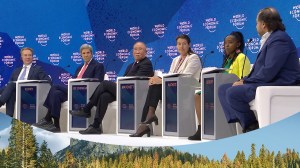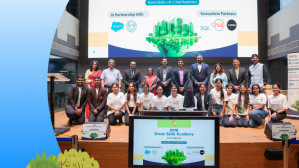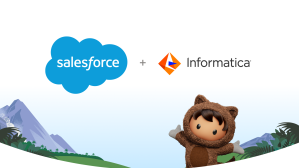Quick Take:
- The World Economic Forum (WEF) hosted its Annual Meeting in Davos, Switzerland this week, for the first time in person since 2019.
- Salesforce executives, including Salesforce Chair and Co-CEO Marc Benioff, Chief Financial Officer Amy Weaver, and Chief Impact Officer Suzanne DiBianca, participated in a variety of events to highlight how the company is creating a more sustainable environment and effective global economy.
Salesforce was founded with a vision to be a different kind of company — one that wanted to change the way the world does business while improving the state of the world. In creating the 1-1-1 model, way back in 1999, Salesforce committed to leveraging its technology, its people, and its philanthropy to operationalize giving.
For 20 years, Salesforce has attended the World Economic Forum Annual Meeting in Davos to carry that vision forward, joining multi-stakeholder dialogues that address today’s most pressing challenges.
While at the event, Salesforce announced plans to purchase $100 million of durable carbon credits from technologies that remove carbon from the air at scale, as part of its participation in the First Movers Coalition. It also hosted a guided walking tour with nonprofit organization Arctic Basecamp, connecting WEF attendees with Davos youth to discuss climate action and air quality as part of Davos Codes.
Salesforce executives also participated in panel discussions centered on rebuilding societal trust, protecting the environment, accelerating innovation to address the Sustainable Development Goals (SDGs), 1 trillion trees to curb climate change, and leading the way to net zero. Conversation highlights include:
A new ‘environmental capitalism’
Of the roughly 270 panels at Davos, one-third were about climate change or its direct effects. The world’s top climate scientists have warned that to avoid the most devastating impacts of climate change, the world must significantly reduce greenhouse gas emissions this decade.
On stage in the ‘Safeguarding our Planet and People’ session, John Kerry, the United States’ first Special Presidential Envoy for Climate, called on the agility of the private sector to help fuel the shift society needs: “No government will move fast enough to solve this crisis by itself. We need the private sector all around the world to step up.”
Watch now: Safeguarding our Planet and People
Salesforce Chair and Co-CEO Marc Benioff, who joined the session, added that the private sector can play a pivotal role in addressing climate change. Said Benioff, “I’m ready for a new environmental capitalism. Every company here at the Forum should be net zero and fully renewable.”
Benioff also commented on Salesforce’s own commitments: “It’s very meaningful to me that we’re net zero as a company, and that we’re fully renewable now. It’s not some future commitment that we’re making. The planet is a key stakeholder today.”
As Benioff mentioned, Salesforce has achieved net zero residual emissions as of September 2021, and 100% renewable energy for global operations by procuring renewable energy equivalent to its electric energy usage. To help other companies transition to net zero, Salesforce built Net Zero Cloud to help organizations like Mastercard, JetBlue, TELUS, and Deloitte Germany accelerate their sustainability journeys.
Suzanne DiBianca, Salesforce’s Chief Impact Officer, also called out Salesforce’s work to create a common set of standards among companies tracking their carbon. “We set up something called the Blue Carbon Buyers Alliance so we can create a community amongst companies [and gain] a common language, common standards that we’re using in the absence of anything in the regulatory environment,” she said. “We need to hold each other accountable and we have to be really transparent.”
Rebuilding societal trust with key institutions
According to the 2022 Edelman Trust Barometer, societal distrust is at an all-time high. Nearly 6 in 10 respondents say their default tendency is to distrust something until they see evidence it is trustworthy. Government, business, and civil society leaders must gain the faith of citizens, consumers, and communities at a time when social cohesion and multilateral agreements are crucial to global recovery.
Salesforce President and Chief Financial Officer Amy Weaver spoke on stage about how businesses can build trust with their customers and employees. Said Weaver, “Customers want to do business with companies that they trust and are transparent with them. Employees, especially with this ‘Great Resignation’ or ‘Great Reshuffle,’ have really never had more power. They want to work for companies that they trust and companies that they believe have their back.”
Employees, especially with this ‘Great Resignation’ or ‘Great Reshuffle,’ have really never had more power. They want to work for companies that they trust and companies that they believe have their back.
Amy Weaver, President and Chief Financial Officer, Salesforce
Salesforce itself is committed to building trust with customers by ensuring products are designed ethically and responsibly. In 2018, Salesforce created the Office of Ethical and Humane Use to ensure that Salesforce technology was used to help — not harm — society and uphold the basic human rights of every human being. Salesforce’s Ethics by Design model embeds ethics and inclusion into the product design and development process.
The power of ecopreneurship and innovation to accelerate progress on SDGs
Ecopreneurs, or entrepreneurs focused on environmental or social challenges, offer massive potential to help curb the climate crisis, but have historically struggled to find funding to fuel their innovation. That’s why nearly two years ago, the World Economic Forum, Deloitte, and Salesforce launched UpLink, a digital platform to foster mass participation from entrepreneurs, community groups, and other interested parties or individuals to meet the UN’s Sustainable Development Goals.
Celebrating the success of UpLink two years later, Benioff said, “We’re committed to an ecopreneur revolution — energizing incredible young entrepreneurs dedicated to the environment.”
We’re committed to an ecopreneur revolution — energizing incredible young entrepreneurs dedicated to the environment.”
Marc Benioff, Chair and Co-CEO, Salesforce
Punit Renjen, Chief Executive Officer at Deloitte, applauded the direct impact UpLink has created. “One reason why we started Uplink was to bridge the disconnect that exists between innovators, ecopreneurs, and access to resources and capital; and UpLink was that bridge.”
Watch now: Driving Forward the Trillion Trees Movement featuring Acción Andina
Salesforce additionally supports other innovations to help curb the climate crisis. Two years ago, Salesforce joined 1T.org, a global movement to restore, conserve and grow 1 trillion trees by 2030, and is almost halfway through its goal of to conserve, restore, and grow 100 million trees.
Looking ahead
As Davos 2022 comes to a close, Salesforce recognizes the opportunity to continue these critical conversations and help ensure business is a platform for change.
To learn more about the news announced at Davos, check out this announcement. To watch more events from Davos, check out Salesforce+.



















